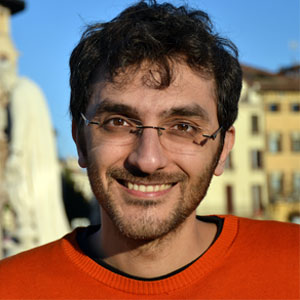Giuseppe Vallone
- Università di Padova
- https://www.unipd.it/
10 ottobre 2019 - SESSIONE: Cloud e servizi: modelli, novità e casi d'uso - I
 Quantum Technologies for cyber-security
Quantum Technologies for cyber-security

Quantum Technologies for cyber-security
 Professore associato presso il Dipartimento di Ingegneria dell'Informazione dell'Università di Padova da maggio 2019. Ha conseguito il dottorato di ricerca in Fisica presso l'Università di Torino nel 2006. Dal 2006 al 2011 ha lavorato nel gruppo sperimentale di ottica quantistica dell'Università Sapienza di Roma. Dal 2011 al 2019 è stato Ricercatore a tempo determinato presso l'Università di Padova. La sua ricerca si concentra sull’informazione quantistica, sulla generazione di stati fotonici, sulle comunicazioni quantistiche, sui generatori di numeri casuali quantistici
Ha più di 100 pubblicazioni tra cui 85 lavori su riviste internazionali con peer review nell'area dell'ottica quantistica e dell'informazione quantistica (Researcher ID: H-7579-2012).
È docente di due corsi presso l'Università di Padova: "Quantum information and computing", primo anno del corso di laurea magistrale "ICT for internet and multimedia", e "Elementi di Fisica II", secondo anno della laurea triennale in Ingegneria Informatica.
Professore associato presso il Dipartimento di Ingegneria dell'Informazione dell'Università di Padova da maggio 2019. Ha conseguito il dottorato di ricerca in Fisica presso l'Università di Torino nel 2006. Dal 2006 al 2011 ha lavorato nel gruppo sperimentale di ottica quantistica dell'Università Sapienza di Roma. Dal 2011 al 2019 è stato Ricercatore a tempo determinato presso l'Università di Padova. La sua ricerca si concentra sull’informazione quantistica, sulla generazione di stati fotonici, sulle comunicazioni quantistiche, sui generatori di numeri casuali quantistici
Ha più di 100 pubblicazioni tra cui 85 lavori su riviste internazionali con peer review nell'area dell'ottica quantistica e dell'informazione quantistica (Researcher ID: H-7579-2012).
È docente di due corsi presso l'Università di Padova: "Quantum information and computing", primo anno del corso di laurea magistrale "ICT for internet and multimedia", e "Elementi di Fisica II", secondo anno della laurea triennale in Ingegneria Informatica.
 Associate Professor at the Dip. of Information Engineering of the University of Padova from may 2019. He got his Ph.D. degree in Physics at the University of Torino in 2006. From 2006 to 2011 he worked in the experimental Quantum Optics Group of the Sapienza University of Rome. From 2011 to 2019 he was Assistant Professor at the University of Padova. His research is focused on quantum information, photonic states, quantum communication, quantum random number generators, Orbital Angular Momentum states.
He has more than 100 publications including 85 peer-review papers in international journals in the area of quantum optics and quantum information (Researcher ID: H-7579-2012).
He is lecturer of two courses at the University of Padova: “Quantum information and computing”, first year of the master’s degree “ICT for internet and multimedia”, and “Elementi di Fisica II (electromagnetism)”, second year of the Informatics Engineering bachelor’s degree.
Associate Professor at the Dip. of Information Engineering of the University of Padova from may 2019. He got his Ph.D. degree in Physics at the University of Torino in 2006. From 2006 to 2011 he worked in the experimental Quantum Optics Group of the Sapienza University of Rome. From 2011 to 2019 he was Assistant Professor at the University of Padova. His research is focused on quantum information, photonic states, quantum communication, quantum random number generators, Orbital Angular Momentum states.
He has more than 100 publications including 85 peer-review papers in international journals in the area of quantum optics and quantum information (Researcher ID: H-7579-2012).
He is lecturer of two courses at the University of Padova: “Quantum information and computing”, first year of the master’s degree “ICT for internet and multimedia”, and “Elementi di Fisica II (electromagnetism)”, second year of the Informatics Engineering bachelor’s degree.
Tecnologie quantistiche per la cyber-security
 Negli ultimi due decenni, le tecnologie quantistiche ha fatto enormi progressi, dalle dimostrazioni di principio alle applicazioni pratiche: la Quantum Key Distribution (QKD) e i Quantum Random Number Generators (QRNG) rappresentano due esempi paradigmatici di tali applicazioni. La QKD consente lo scambio di chiavi crittografiche sicure tra due utenti autorizzati con la garanzia di una sicurezza incondizionata grazie ai principi della meccanica quantistica. I QRNG si basano sulla casualità intrinseca delle misure quantistiche.
In questo seminario, verranno inizialmente illustrati i principi di base della QKD e dei QRNG. Verrà quindi discusso lo stato dell'arte, i risultati che abbiamo recentemente ottenuto nel nostro gruppo e le prospettive delle tecnologie quantistiche per la sicurezza informatica.
Negli ultimi due decenni, le tecnologie quantistiche ha fatto enormi progressi, dalle dimostrazioni di principio alle applicazioni pratiche: la Quantum Key Distribution (QKD) e i Quantum Random Number Generators (QRNG) rappresentano due esempi paradigmatici di tali applicazioni. La QKD consente lo scambio di chiavi crittografiche sicure tra due utenti autorizzati con la garanzia di una sicurezza incondizionata grazie ai principi della meccanica quantistica. I QRNG si basano sulla casualità intrinseca delle misure quantistiche.
In questo seminario, verranno inizialmente illustrati i principi di base della QKD e dei QRNG. Verrà quindi discusso lo stato dell'arte, i risultati che abbiamo recentemente ottenuto nel nostro gruppo e le prospettive delle tecnologie quantistiche per la sicurezza informatica.
Quantum Technologies for cyber-security
 Within the last two decades, Quantum Technologies have made tremendous progress, from proof of principle demonstrations to real life applications: QuantumKeyDistribution (QKD) and Quantum Random Number Generators (QRNGs) represent two paradigmatic examples. QKD allows the exchange of secure cryptographic keys between two authorized users with the guarantee of unconditional secrecy thanks to quantum mechanical principles.
QRNG are based on the intrinsic randomness of quantum measurements.
Here we first review the basic principles of QKD and QRNGs. We then discuss the state of the art, the results we have recently obtained in our group and the perspectives of quantum technologies for cybersecurity.
Within the last two decades, Quantum Technologies have made tremendous progress, from proof of principle demonstrations to real life applications: QuantumKeyDistribution (QKD) and Quantum Random Number Generators (QRNGs) represent two paradigmatic examples. QKD allows the exchange of secure cryptographic keys between two authorized users with the guarantee of unconditional secrecy thanks to quantum mechanical principles.
QRNG are based on the intrinsic randomness of quantum measurements.
Here we first review the basic principles of QKD and QRNGs. We then discuss the state of the art, the results we have recently obtained in our group and the perspectives of quantum technologies for cybersecurity.







